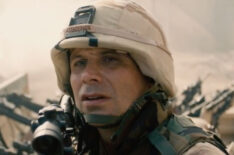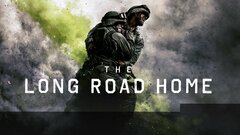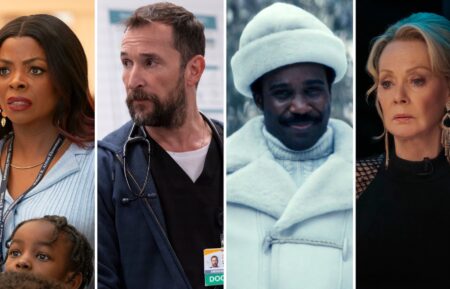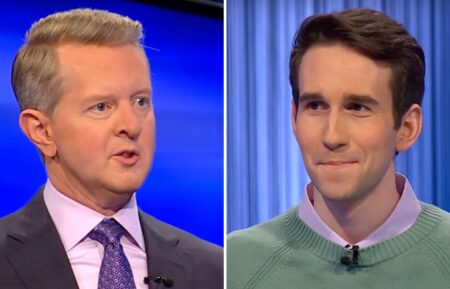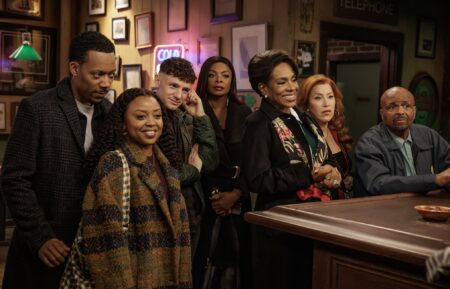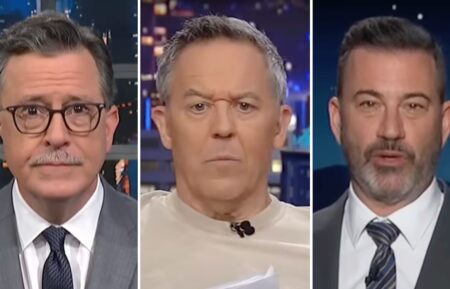Sarah Wayne Callies: Nat Geo’s ‘The Long Road Home’ Is ‘a War Story That Passes the Bechdel Test’
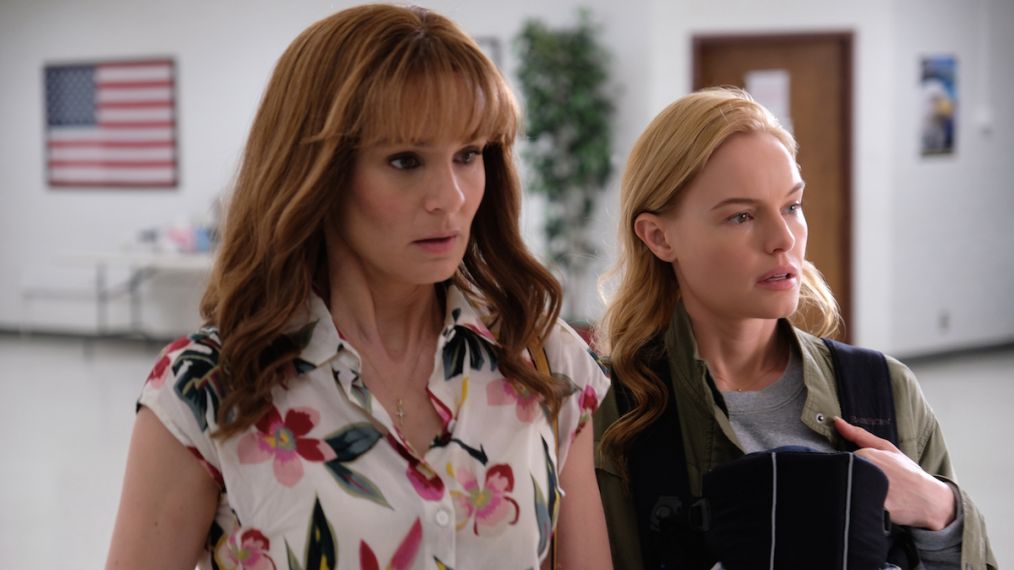
Yes, National Geographic’s event series The Long Road Home boasts all the trappings of a big-budget war film—top-notch cast, realistic battle scenes and enough camo and ammo to stock a real-life army base. But Home claims a critical something that most military-based films and series can’t: its battles, its characters, its heartbreak and heroism are all based in real-life.
Culled from ABC News Chief Global Affairs Correspondent Martha Raddatz’s 2008 bestseller of the same name, Home relives a heroic fight for survival during the Iraq War when the 1st Cavalry Division from Fort Hood was ferociously ambushed during a humanitarian mission on April 4, 2004, in Sadr City, Baghdad—a day that became known as Black Sunday. By the time a daring rescue was accomplished, 8 men were dead, some 50 others injured and the Iraq conflict redefined. And countless soldiers and their families would never, ever be the same.
The Walking Dead’s Sarah Wayne Callies plays LeAnn Volesky, wife of the ambushed platoon’s commander Lt. Col. Gary Volesky (Michael Kelly) and leader of the battalion’s Family Readiness Group, a support system for wives and families during deployment. As news of the ambush and mounting casualties breaks, LeAnn bears the brunt of the families’ fear and anger over lack of information due to Army regulations, even as she fears for her own spouse.
TV Insider sat down with Callies to talk about the show and the joys and pressures of playing a real-life heroine.
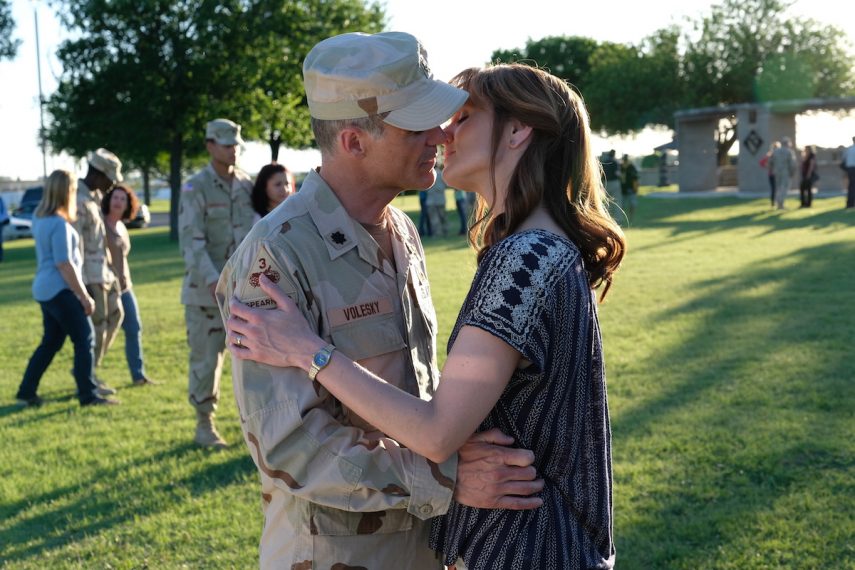
Michael Kelly as Lt. Col. Gary Volesky (L) and Sarah Wayne Callies (R) as LeAnn Volesky on set of The Long Road Home at U.S. Military post, Fort Hood, Killeen, Texas.
You’ve played a number of strong and complex women over the course of your career, but this strong, complex woman is a real woman. Tell me your first impressions when this opportunity to play LeAnn came your way?
One of the first things that I thought when I read the script is this is actually a war story that passes the Bechdel test [when two scripted female film characters converse about something other than a man]. That’s really rare. To the extent that there are roles for women in war movies, they’re often relegated to the thinnest of props to make men look either heroic or villainous. Maybe because it was based on a book written by Martha Raddatz, who is such a smart, complex realist in her own right, these are fully fleshed-out female characters. And of course, they’re not characters; they’re real people. And the impact of war ripples so far beyond the soldiers involved. For every soldier that’s shot, there’s the tip of an iceberg of 800 people that have to navigate that grief and that loss.
What sort of contact did you have with the real LeAnn?
I did speak with LeAnn over e-mail. We actually didn’t have much of an opportunity to connect, because Gary was getting his third star as a general—which is giant—and they had just been relocated from one base to another. So I relied on other people’s impressions of her. Martha’s, obviously, from the book. But what I came to find is that LeAnn is actually a woman who is maybe better described by other people. Because if you ask Gary and LeAnn what they did, they would say, “Nothing. Didn’t do anything.” Their biggest concern in this process is that they will be made to look like heroes, because that’s the last thing they want.”
How did others describe her?
You talk to other people, they will say, “I couldn’t have gotten through it without LeAnn. LeAnn was our rock. LeAnn was selfless enough to know that her husband was in a conflict and she was gonna deal with the emotions and concerns of all of the other wives of the husbands in the conflict.” So I think playing LeAnn became less about playing the quote-unquote reality of “do we have the same hairstyle” and “do we have the same clothes,” and more about playing the truth. Which is: Can I find that spirit of absolute devotion, total service and selflessness? … To try and find parts of her in me makes me feel like a better person.
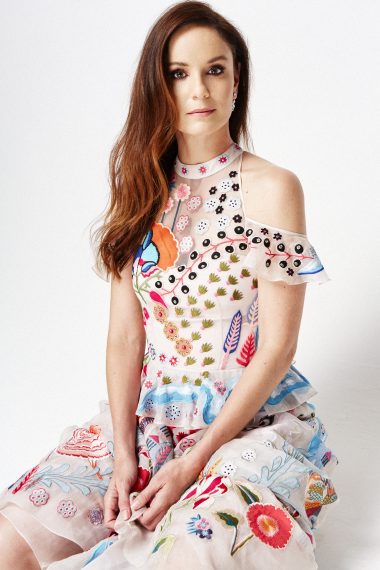
Sarah Wayne Callies (Photography: Isaac Sterling | Hair: Hair by Gui | Make Up: Anton K | Styling: Victor Blanco)
Tell us about working with Kate Bosworth and playing the relationship between LeAnn and Kate’s struggling new mother, Gina Denomy.
Kate’s a gangster! She showed up on set and we jumped right in. The very first thing we shot was the scene where I call her and tell her that the platoon’s been attacked—she hears that her husband is in a firefight, basically. It’s a really difficult scene. We had a moment where we both looked at each other and realized, I have one lifeline in this room and it’s you, so I’ll give you anything you need. Let’s do it. That was our introduction to each other.
Kate brought so much heart and so much passion to do it right, and so much courage—a total lack of vanity. It was interesting, because LeAnn is a mentor for Gina, but Kate’s been in this business longer than I have and I feel like I learned a tremendous amount from her. I loved it. Loved every minute of it. She’s a gem of a human being.
How did the series impact you personally?
I wasn’t from a military family; I was from an academic family. But I married into one, and one of the things that I’ve observed is that—among the many divides in our country—there is a military-versus-civilian divide. It’s a divide of ignorance. And often it’s also a divide of class. A lot of men in my husband’s family enlisted because there was no way they were going to go to college otherwise. So if this is an opportunity to bring military families into a story where they feel represented with respect, and bring non-military families into a story where they can start to understand and develop compassion and empathy that’s based on experience, then I think we’ve done our jobs.
The Long Road Home, Series Premiere, Tuesday, Nov. 7, 9/8c, National Geographic

